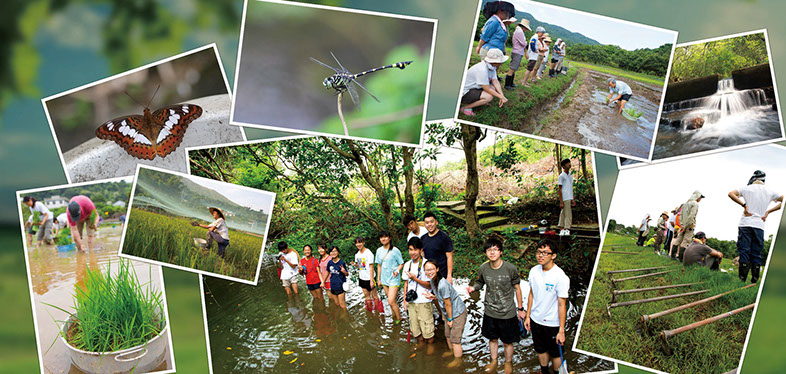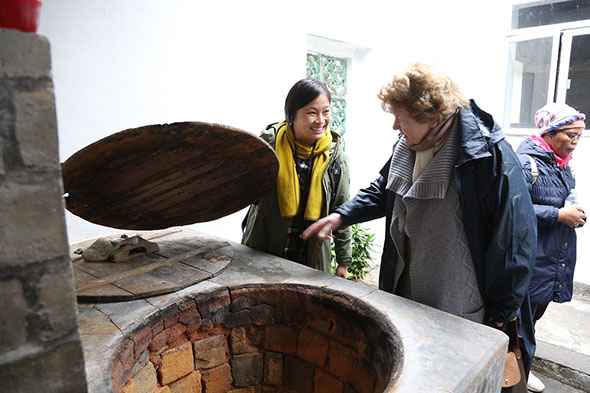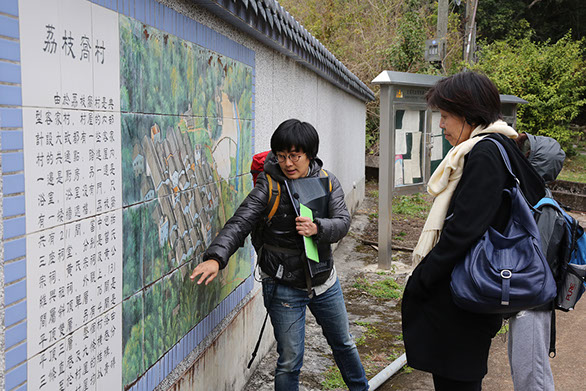
It Takes a Village
A team that encompasses local residents, academia and the private sector has joined forces to embark on a long-term programme to develop a blueprint for the revitalisation of villages and rural communities in Hong Kong and other Asian cities in ways that are both innovative and sustainable.
This impactful project, entitled ‘Living Water and Community Revitalisation – An Agriculture-led Action, Engagement and Incubation Programme at Lai Chi Wo’, aims to put the life back into a wilting village community by implementing sustainability initiatives and innovations in farming, training, education and research.
Located in the remote northeastern part of the New Territories, Lai Chi Wo is a traditional Hakka village which declined because of changes in economic circumstances, including China’s open-door policy that made it difficult for Hong Kong’s rural communities to compete with supplies from the Mainland. “Many of the inhabitants moved elsewhere to make a better living,” explained Dr Winnie Law, Principal Lecturer from the Faculty of Social Sciences and Principal Investigator on the Lai Chi Wo project. “We hope to put the life back into this community through reviving its agriculture, as well as conserving it as a valuable part of our rural heritage.”
Originally initiated by the Kadoorie Institute, the multi-faceted project is now housed under the Faculty of Social Sciences’ Policy for Sustainability Lab. Because of its cross-disciplinary nature, support comes from many sectors. These include: from academia – HKU’s Department of Civil Engineering, Department of Geography, School of Biological Sciences and Division of Landscape Architecture; from the government – the Environment Bureau and the Agriculture, Fisheries and Conservation Department; and from the private sector – HSBC, which has been involved with this pioneering venture from the start.
Asked why Lai Chi Wo was chosen, the Faculty of Social Sciences’ Ms Katie Chick, who is the Project Manager in charge of the development and implementation of the project, said: “It is rich in both ecological and cultural value. Even though the population has been diminished there is still a strong community feel – a sense of ownership and belonging. The residents are open-minded about introducing change.”
In addition, the village needed help. “The farmland once comprised active paddy terraces, but these had been abandoned since the late 1970s,” Ms Chick continued. “The project is re-introducing farming with more consideration given to eco- and environmentally-friendly methods. The hope is to establish a new mutually beneficial relationship between nature and culture.”
Sustainability is key and the team is introducing a whole slew of measures.
They cover 13 of the 17 Sustainable Development Goals suggested by the United Nations in its Transforming our World agenda.

Dr Winnie Law (left) leading overseas visitors to explore the Hakka culture in Lai Chi Wo.

![]() We hope to put the life back into this community through reviving its agriculture, as well as conserving it as a valuable part of our rural heritage.
We hope to put the life back into this community through reviving its agriculture, as well as conserving it as a valuable part of our rural heritage. ![]()
Dr Winnie Law
Long-term initiative
The revitalisation programme will take place over several years. Initial preparations began in 2013, including leasing the land, building relationships and trust with the villagers and finding interested community groups – such as the Hong Kong Countryside Foundation, the Produce Green Foundation and the Conservancy Association – to help prepare the six hectares of farmland surrounding the village for the new agricultural initiatives.
”For the living water aspect of the programme, these include the introduction of a ‘whole catchment management approach’ where freshwater/wetland habitats are understood and monitored through hydrology and ecological research conducted by University members,” said Dr Law. “The data collected will be used to formulate a holistic plan to manage the freshwater and biodiversity resources of Lai Chi Wo in a sustainable manner,” she continued.
Research initiatives encompass many areas including: hydrological modelling; testing and evaluating a variety of eco-friendly and low-carbon farming methods; monitoring biodiversity; reviewing the feasibility of re-introducing species such as the rice fish (Oryzias); managing artificial wetlands; experimenting with social enterprises, and carrying out an oral history study.
The programme is a major educational undertaking across the community – at large, as well as in Lai Chi Wo – and the number of people who are getting involved is substantial. “We have trained 60 people to be community revitalisation leaders, and more than 3,000 visitors have gone on ecotours of the village and its surrounding land,” said Dr Law.
More than 3,000 students have also joined the initiative. “From HKU, the opportunities to participate include via university internships, General Education and Leadership programmes, PhD and MPhil research study and undergraduate and taught masters programmes,” said Dr Law. “And in addition to university students getting involved, we also have secondary school students doing curriculum-based education projects, and primary and kindergarten children taking part in environmental art initiatives.
“There are options for teachers too. So far, 150 have participated in our sustainable rural development training scheme for senior high school teachers in Geography, Liberal Studies and Biology. And, we also do volunteer projects which corporations can get involved in.”
Another programme offers training to people who are interested in setting up small farms and local businesses in Lai Chi Wo, and it has attracted emigrated villagers and city-dwellers. As well as reviving the traditional rice paddies in a more sustainable form, the village’s farmland is now set to eco-friendly organic farming of over 10 kinds of produce.

Ms Katie Chick (left) explaining the village orientation to the representative of the Consulate-General of Japan in Hong Kong.
Policy for Sustainability Lab
The programme is now part of an even larger undertaking by the Faculty of Social Sciences, namely the launch of its Policy for Sustainability Lab (PSL). Associate Dean (Innovation) Professor Danny Lam Wai-fung, who is Director of the PSL, said that its mission is to contribute to the attainment of sustainability and specifically to incubate novel solutions to the challenges set out in the United Nations’ 17 Sustainable Development Goals (SDGs). This includes developing innovative solutions to inform policy on environment sustainability, as well as raising people’s awareness, facilitating collective action and fostering civic engagement.
“In short, the PSL looks at innovative solutions for sustainability challenges,” he said. “The Lai Chi Wo project – the whole of it – is a social innovation that delivers integrated sustainability well-being. It is also an action project that delivers strong knowledge exchange value to society.”


